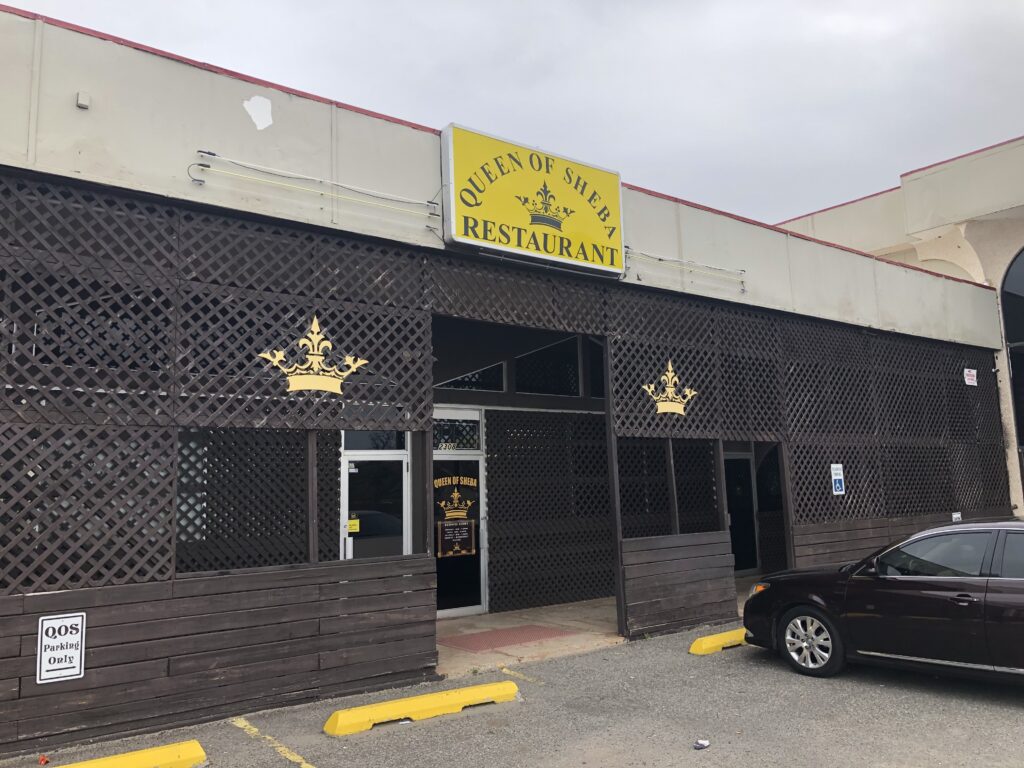
A love for Oklahoma and its “beautiful people” inspired an Ethiopian woman to open the state’s first Ethiopian restaurant, featuring traditional dining and community eating.
Queen of Sheba’s owner Mimi Younis said she was born in Ethiopia, but lived in the U.S. for most of her life. Her family resided in Florida until a visit to Oklahoma surpassed Younis’ expectations and led to her opening the restaurant 16 years ago.
“(Oklahoma) just blew my mind,” Younis said. “It’s a great state. There’s beautiful people here.”
She said she moved her family from Florida in 2005 after visiting her uncle in Oklahoma, where she came up with the idea to bring something “new” and “different” to the state of Oklahoma.
While the outside of the restaurant blends in with the other stores in the shopping center, the inside displays unique Ethiopian culture showcased throughout the entirety of the lobby. The Ethiopian alphabet, accounts of the culture’s history, flags and artifacts are all displayed on the walls of the restaurant.
Queen of Sheba is open three days a week due to the restaurant’s limited number of staff members. Guests can enjoy an Ethiopian meal on Thursdays, Fridays and Saturdays from 4-9:30 p.m. Outside of their hours, the restaurant caters for events such as weddings.
The restaurant has a selection of three meat dishes and five vegetarian dishes, restaurant manager Ermias Wondimu said. The restaurant gives suggestions to first-time guests who have never experienced Ethiopian cuisine before.
“Our (dining style) is completely different than the rest of the world has, never ever seen before,” Younis said. “Except in Ethiopia, this is the way we eat.”
Guests at Queen of Sheba adopt the Ethiopian culture by dining as a community, eating with their hands and sharing food, plates and cultures with each other, Younis said.
“It’s a hidden treasure place. You sit together, you share your food together,” Younis said. “It’s a community and it’s a very good experience.”
Younis said the restaurant makes teff, the smallest grain in the world, and a sourdough flatbread called injera. No other restaurant in Oklahoma makes injera bread.
According to their menu, appetizers include sambusa and categna, a spicy injera. For entrées, the restaurant offers a selection of fish, chicken, lamb and beef.
Queen of Sheba continues to instill its cultural roots by holding coffee ceremonies where guests can opt to sit and enjoy three rounds of Ethiopian coffee, Younis said. The coffee is different from American coffee and is made from scratch. The use of older culture makes for a good experience in the restaurant’s dining, she said.
Next to the entrance of the restaurant is a roped-off area with a low table and two stools designed with cultural illustrations, used for the coffee ceremonies.
Younis said she runs her restaurant like a “Mom and Pop” with her husband Solomon Younis. She prefers to keep the staff at the restaurant “tight” and limited to family and friends.
Wondimu said he was a student at Oklahoma State University when he met Younis while searching for a venue to play reggae and Afro-Caribbean music.
“Even though the restaurant itself is trying to portray a traditional way of dining in Ethiopia, we want to touch on the modern side of the (United States) as well as the traditional,” Wondimu said.
Wondimu said the customers kept the business open after COVID-19 by going out of their way to support the business throughout the pandemic. Unlike other businesses during the pandemic, Queen of Sheba did not face a loss of business due to limited hours, small staff and high demand for their unique dishes.
“The greatest thing about this restaurant is that we have very loyal, good customers. They want us to stay here and keep on going, so we have a support group,” Younis said. “See, a lot of people, they want us to stay. They don’t want us to go away. With the good folks like that, we’re still here and kicking it.”
Regular customer Marcus Muse said he has been visiting Queen of Sheba for seven years. His favorite part about Queen of Sheba is the family aspect and being encouraged to learn Ethiopian phrases during the dining experience, he said.
“The platters are set up for multiple people and you are encouraged to eat with your hands,” Muse said. “That’s just the cultural way of doing things and they kind of bring that into the United States. That’s totally different from anywhere that you might go to in the city.”
Muse said he appreciated the restaurant’s respect for culture. The staff is welcoming to everyone, especially to African Americans who want to connect with their African heritage, he said.
“It breaks you out of the norm and gets you into a new experience,” Muse said.
Younis said Queen of Sheba relies on word of mouth rather than advertising, but still receives recognition from numerous magazines such as The Oklahoma Gazette.
“It’s not always about the food, it is always about the culture and what brought it together to the people,” Younis said.
